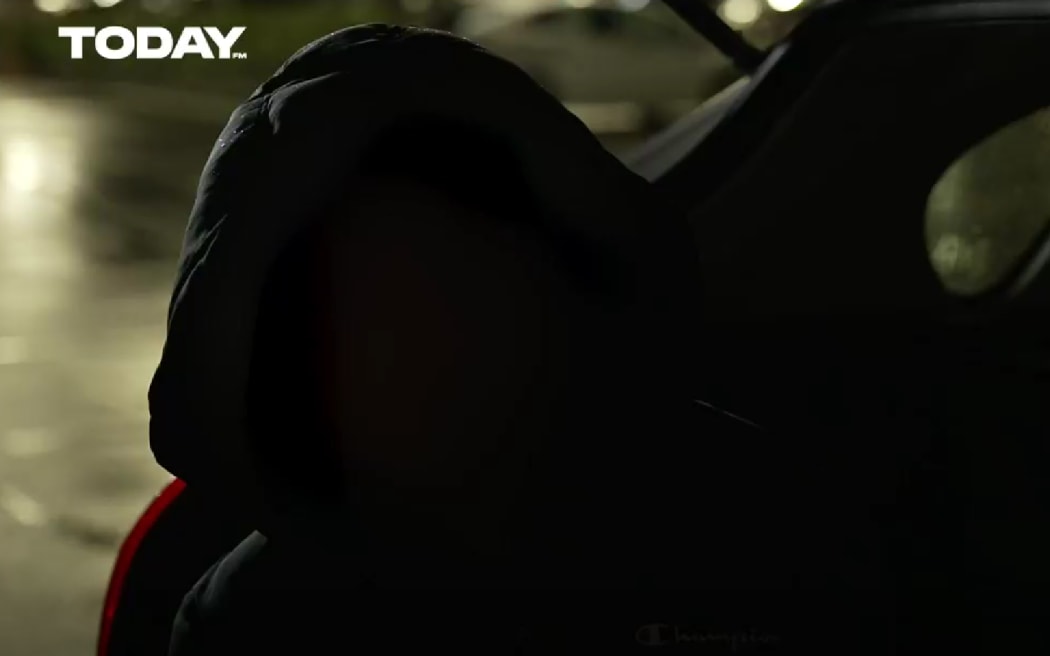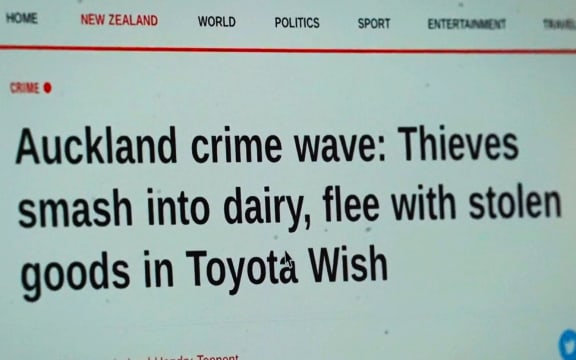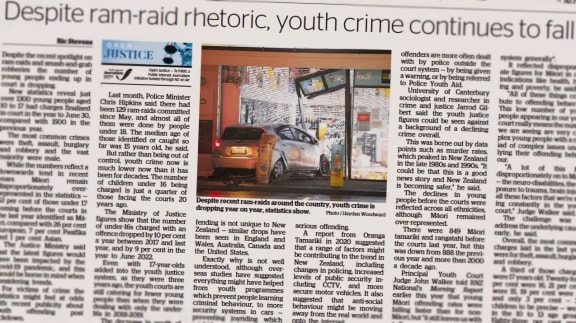Two new pieces of reporting have added context and depth to the headlines blaring about a 'youth crime wave'.

A still from Behind The Raids: Children At The Wheel Photo: MEDIAWORKS
Last week The New Zealand Herald carried a headline that might have come as a surprise to its regular readers.
'Despite ram-raid rhetoric, youth crime is dropping year on year'.
Ric Stevens, a journalist for the publicly funded Open Justice Project, pointed to statistics showing 1300 young people aged 10 to 17 had charges finalised against them in court in the year to June 30, compared to 1500 the previous year.
Over the longer term, the trend is even more stark.
About 5000 young people went before the courts in 2007, before those numbers went into long-term decline.

One of many recent headlines citing a 'crime wave.' Photo: RNZ Mediawatch
These figures appear to contradict other headlines from the Herald about a 'youth crime spike' or an 'Auckland youth crime wave'.
1News has also reported a youth crime wave, while Newshub has spoken about “rampant youth crime” in the North Island, and on RNZ, National’s Mark Mitchell raised the spectre of a ‘tsunami’ of youth crime.
Youth crime has gone up in Auckland and ram raids in particular have spiked.
Police minister Chris Hipkins said 129 raids have been committed by offenders with a median age of 15, since May. The justice minister Kiritapu Allan admitted Covid-19 lockdowns may have had an impact on the figures.

Open Justice reporter Ric Stevens weighs up youth crime headlines against the latest data. Photo: RNZ Mediawatch
National’s justice spokesman Paul Goldsmith rejected the relatively rosy recent youth crime stats, citing what “everyone is seeing” on the ground and asking if there was a "don't ask, don't tell situation" masking the reality.
But Assistant Police Commissioner Chris de Wattignar told The Herald there had been "very real drop off in actual offending."
The headlines asserting a 'youth crime spike' are not backed up by the current hard data. The stats don’t show a spike in youth crime, let alone a wave, swell, or tsunami.
Outside of highly visible headline-generating crimes they show the opposite - and Ric Stevens Open Justice Project reporting brought to light the ways current coverage could be distorting perceptions of what is actually going on.
Others have also presented a perspective missing many of the stories on youth crime so far.

Tim McKinnel in 'Crime: Need vs Greed' by Octopus Pictures, screening on TVNZ 1 in October 2022. Photo: supplied
Later this month in TVNZ’s Tuesday night Documentary New Zealand slot, former police detective Tim McKinnel investigates how white collar crime is often unreported and unpunished but young people are locked into cycles of crime.
"While society and the media fixate in gang crime and ram-raids and other forms of street crime, we're losing billions of dollars a year in crimes driven by greed. I'm worried that we're locking up the needy and ignoring the greedy,” McKinnel said in Crime: Need vs Greed by Octopus Pictures.
In a new documentary for Today FM - Behind The Raids: Children At The Wheel - Wilhelmina Shrimpton talks to two teenagers who had carried out ram raids – one 13 and the other 15 years old.
Both explained the allure of ram-raiding, with one telling Shrimpton he was taken away from his family by Oranga Tamariki and fell in with a group doing smash-and-grabs as he tried to escape a foster home where he didn’t feel he belonged.
While calls for tough justice to be doled out to lawless youths have been aired by the media in recent months, Shrimpton gave the teens themselves space to say what they think would fix their situation.
The 15-year-old, named in the documentary as Toby, said people that had been in his situation could have helped.
"They would know you," he said. "They know how you are."
That call for empathy is a running theme in the documentary, with youth justice lawyer Harvena Cherrington pleading for understanding from audiences who might otherwise only encounter these young people in security camera footage of ram raids being carried out.
"The challenges that these young people face are often things that we could not comprehend, and they are making their choices on the basis of those challenges, of those - sometimes - deprivations."
The documentary is a reminder that real people with real problems are behind the headlines about crime waves and tsunamis - and they also have hopes for their lives, just like anyone else.
In one scene, 13-year-old Cam talked about wanting to be a doctor when he is older.
"I want to help people. I don't want to be the person getting my leg cut off, I want to be the person that's helping."
This humanising approach seems to soften some people’s opinions about how we should respond to these teenagers’ actions.
In Behind The Raids: Children At The Wheel, a business owner whose shop has been ram-raided several times responded with forgiveness after being shown a video of one of the teens apologising.
"You never know what happens tomorrow, but if a person says he realises he did something wrong, and he says sorry and he wants to improve, I feel we should give him a chance," he said.
He wasn’t the only one whose mind had been changed. On Today FM Shrimpton said making the documentary also altered her view of young ram-raiders.
"I changed my opinion. [We should] change opinion, change policy, change Oranga Tamariki. Ultimately I hope this changes the course of these kids' lives, and their futures," she said.
"I implore people to watch, because like I said, my views completely changed."
It is worth getting an accurate picture of our youth crime stats, but as it turns out there is nothing that changes your perspective like hearing from the people behind those numbers.
Read more on youth crime:
'Ram raid epidemic' reports deliver a distorted message on youth crime
'Hopeless' family situations behind youth crime - Children's Commissioner
Youth offending rates fall fore than 60 percent in a decade
400 percent increase in ram raids, few prosecution - police data
Most youth in ram raids not in schools - Oranga Tamariki
More to ram raids than meets the eye - child advocates


